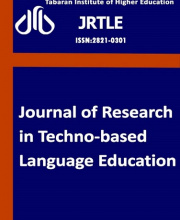The Effect of Teacher’s Voice vs. Written Messages via WhatsApp on Iranian EFL Learners’ Learning and Retention of Lexical Collocations
حوزههای تخصصی:
Vocabulary learning is a crucial part of acquiring a language. According to Webb (2014), learning vocabulary is essential for language proficiency, but learning words regardless of their relationship with other words is not enough. Accordingly, this study aimed to investigate the effect of teacher’s voice vs. written messages via WhatsApp on Iranian EFL learners’ learning and retention of lexical collocations. In order to conduct this study, 100 female English language learners were asked to take part in the OPT test and sixty participants whose score ranged one standard deviation above and below the mean were selected and divided into three groups, as one control and two experimental. Then the pretest was administered before any treatment. One of the experimental groups was treated via the teacher’s voice and the next one via written messages through WhatsApp for ten sessions. The participants then took part in the posttest. In order to test the participants’ retention of collocations, they were asked to take part in the two-week delayed posttest, too. The analyses of obtained data showed that the teacher’s voice via WhatsApp had a statistically significant effect on both EFL learners’ learning and retention of lexical collocations. However, the teacher’s written messages via WhatsApp just had a statistically significant effect on EFL learners’ learning of lexical collocations, and it did not have a statistically significant effect on retention of lexical collocations. This is study is significant for all EFL/ESL learners, teachers, and English language institutes.
